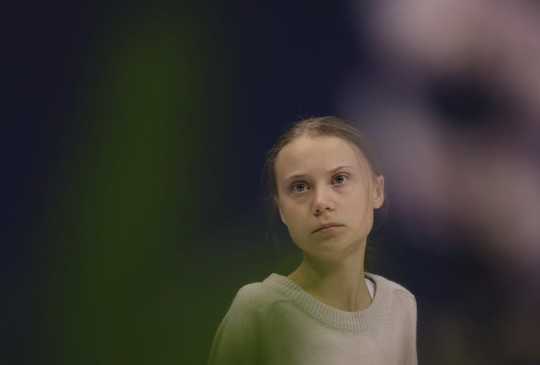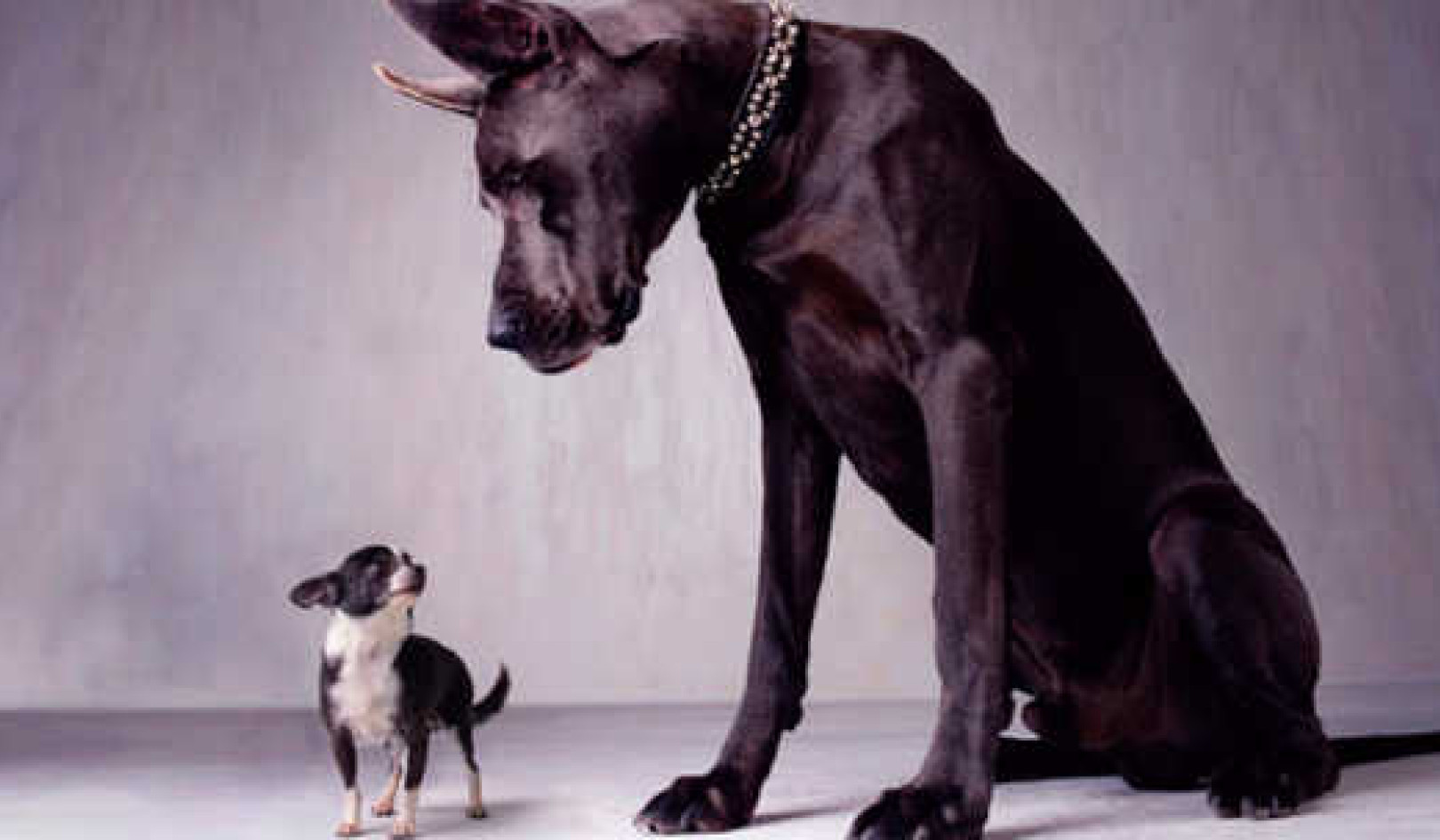 Climate activist Greta Thunberg listens during a meeting with climate scientists at the COP25 summit in Madrid, Spain. AP Photo/Paul White
Climate activist Greta Thunberg listens during a meeting with climate scientists at the COP25 summit in Madrid, Spain. AP Photo/Paul White
She came from obscurity and ignited a global movement. Beginning with a small but persistent act of protest outside the Swedish parliament, she inspired millions to join her. Her fiery speech to the United Nations in September 2019 warned of the end of the world. Her unfailing determination and passion makes her appear otherworldly, even uncanny, an affect largely attributed to her diagnosis of Asperger’s syndrome.
So it’s no surprise that many people – along with media outlets like The Irish Times, The Telegraph and The Washington Times – have cast Greta Thunberg as a prophet.
When Time announced her as “Person of the Year,” it continued the trope, using an evocative photograph of Thunberg standing on a rocky shoreline, staring at the heavens, for the cover.
.@GretaThunberg is TIME's 2019 Person of the Year #TIMEPOY https://t.co/YZ7U6Up76v pic.twitter.com/SWALBfeGl6
— TIME (@TIME) December 11, 2019
As a researcher on the history of childhood, I’ve been disturbed to see Thunberg described and depicted as a prophet. To me, it risks distorting her message. And it can easily be exploited by climate deniers seeking to counter the appeal of her activism.
Is a climate messiah even necessary?
To some, Thunberg resembles Joan of Arc, the teenage visionary who led the French army into battle in the 15th century and was later canonized as a saint.
To others, Thunberg exemplifies the Judeo-Christian tradition of prophets who speak truth to power; according to one Christian blogger, she offers “a prophetic voice to shake us out of our complacency.”
Yet presenting Thunberg as a prophet is deeply misleading. Classically, prophets are messengers who communicate the voice of God. They convey divine revelation that was previously unknown or misunderstood. Ezekiel predicted the destruction and restoration of Jerusalem. Moses received the Ten Commandments. Muhammad revealed the Quran. Prophets, in other words, see truths that others cannot. They bring us messages that often defy human comprehension.
Thunberg, on the other hand, is simply telling us what we already know. Within the scientific community, there is an overwhelming consensus – going back decades – that humans are causing global warming.
Framing her as a prophet has opened the floodgates to all sorts of messianic theories. This recently took a bizarre turn when a 120-year-old photo with a girl resembling Thunberg surfaced. Now conspiracy theorists are calling Thunberg “a time traveler sent to save us.”
Depictions like this are fodder for her opponents who dismiss what they call her “doomsday activism.” To them, she is a false prophet, and they can portray the people inspired by her as brainwashed cult followers. David Koresh, the leader of the Branch Davidians who died alongside his followers in Waco, Texas in 1993, after all, called himself a prophet. So did Jim Jones, the founder of the Peoples Temple and orchestrator of the 1978 Jonestown Massacre.
To Thurnberg’s credit, even she recoils at the idea that she should be viewed as some sort of savior.
“I don’t want you to listen to me,” she told Congress in September. “I want you to listen to the scientists.”
Being a kid carries enough weight
I would argue that the best way to think of Thunberg is to simply think of her as a child.
This is not demeaning. Far from it. In recent years, young people have offered numerous examples of their ability to exercise independent thought, visionary thinking and leadership. Melati and Isabel Wijsen were 10 and 12 when they began a successful campaign to ban single-use plastics in their native Bali. Malala Yousafzai was 11 when she began to advocate against the Taliban for girls’ right to education. The list goes on: Jazz Jennings, Xiuhtezcatl Martinez, the Parkland activists. Like Thunberg, they challenge our culture’s view of children as powerless and dependent.
Thunberg memorably began her September 2019 UN speech with the words, “This is all wrong. I shouldn’t be up here. I should be back in school on the other side of the ocean.” As Thunberg well knows, the fact that a child needs to scold grown-ups to act on an issue that threatens all of humanity is a powerful example of a political system gone horribly wrong.
Even more critically, focusing on Thunberg’s youth highlights a central tenet of her message: fairness. As any parent can tell you, children tend to view the world in terms of moral absolutes – good and bad, right and wrong, fair and unfair. Indeed, researchers have recently shown that expectations of fairness are deeply ingrained in children, appearing in infants as young as 12 months old.
Ideas of fairness underlie many aspects of Thunberg’s message, from her emphasis on how climate change will affect the poor and marginalized, to her comments about how unjust it is to expect young people to fix a catastrophe caused by generations of political inertia. Her forceful call – “How dare you!” – is not the enraged cry of a petulant child. It is the determined statement of a girl who has not yet developed the moral flexibility that is so often the refuge of adult inaction.
Thunberg is not unraveling the mysteries of our era, or a time traveler sent to stop climate change. Rather, she is a child admonishing selfishness and pleading for fairness.
That’s not prophetic. It’s common sense.
About The Author
Ellen Boucher, Associate Professor of History, Amherst College
This article is republished from The Conversation under a Creative Commons license. Read the original article.
Additional Info
The following has been added to the original article for your information
{vembed Y=gqHOQKE0bik}
Related Books
Climate Leviathan: A Political Theory of Our Planetary Future
by Joel Wainwright and Geoff Mann How climate change will affect our political theory—for better and worse. Despite the science and the summits, leading capitalist states have not achieved anything close to an adequate level of carbon mitigation. There is now simply no way to prevent the planet breaching the threshold of two degrees Celsius set by the Intergovernmental Panel on Climate Change. What are the likely political and economic outcomes of this? Where is the overheating world heading? Available On Amazon
How climate change will affect our political theory—for better and worse. Despite the science and the summits, leading capitalist states have not achieved anything close to an adequate level of carbon mitigation. There is now simply no way to prevent the planet breaching the threshold of two degrees Celsius set by the Intergovernmental Panel on Climate Change. What are the likely political and economic outcomes of this? Where is the overheating world heading? Available On Amazon
Upheaval: Turning Points for Nations in Crisis
by Jared Diamond Adding a psychological dimension to the in-depth history, geography, biology, and anthropology that mark all of Diamond's books, Upheaval reveals factors influencing how both whole nations and individual people can respond to big challenges. The result is a book epic in scope, but also his most personal book yet. Available On Amazon
Adding a psychological dimension to the in-depth history, geography, biology, and anthropology that mark all of Diamond's books, Upheaval reveals factors influencing how both whole nations and individual people can respond to big challenges. The result is a book epic in scope, but also his most personal book yet. Available On Amazon
Global Commons, Domestic Decisions: The Comparative Politics of Climate Change
by Kathryn Harrison et al Comparative case studies and analyses of the influence of domestic politics on countries' climate change policies and Kyoto ratification decisions. Climate change represents a “tragedy of the commons” on a global scale, requiring the cooperation of nations that do not necessarily put the Earth's well-being above their own national interests. And yet international efforts to address global warming have met with some success; the Kyoto Protocol, in which industrialized countries committed to reducing their collective emissions, took effect in 2005 (although without the participation of the United States). Available On Amazon
Comparative case studies and analyses of the influence of domestic politics on countries' climate change policies and Kyoto ratification decisions. Climate change represents a “tragedy of the commons” on a global scale, requiring the cooperation of nations that do not necessarily put the Earth's well-being above their own national interests. And yet international efforts to address global warming have met with some success; the Kyoto Protocol, in which industrialized countries committed to reducing their collective emissions, took effect in 2005 (although without the participation of the United States). Available On Amazon
From The Publisher:
Purchases on Amazon go to defray the cost of bringing you InnerSelf.comelf.com, MightyNatural.com, and ClimateImpactNews.com at no cost and without advertisers that track your browsing habits. Even if you click on a link but don't buy these selected products, anything else you buy in that same visit on Amazon pays us a small commission. There is no additional cost to you, so please contribute to the effort. You can also use this link to use to Amazon at any time so you can help support our efforts.
























